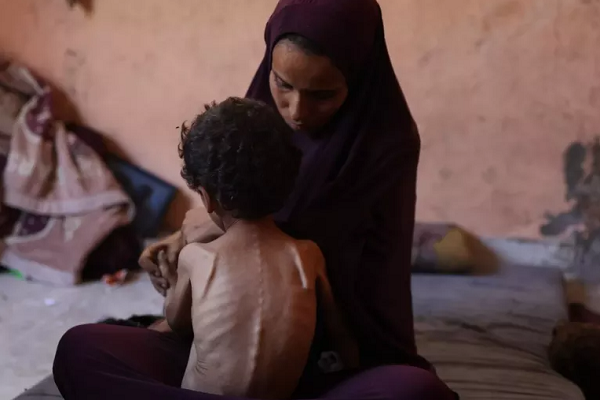‘Calculated Starvation’: Israel Using Food As a Weapon of War despite Ceasefire

Since the ceasefire in early October, Israel claims it is "facilitating humanitarian aid" into the Gaza Strip. But the outcome is a form of genocide, using food, nutrition, and health manipulation. Gaza's markets are filled with carbs and sugar, but essential foods like vegetables, meat, dairy, and eggs are nearly absent. Nutrition has become a distant memory, replaced by the need for survival.
Mohammed al-Najjar, a shop owner in Gaza, described the situation as "calculated starvation."
"What Israel permits seems meant to kill us slowly. Since the ceasefire, trucks have arrived daily, but their supplies, including flour, rice, biscuits, and juice, are insufficient. They fill the stomach temporarily but harm the body," he told The New Arab.
"In Gaza, shortages of meat, poultry, dairy, and oil exist. It's not aid but control; people eat to survive, not thrive. Children appear pale and weak. Tomatoes cost 35 shekels per kilo, and chicken is a luxury for the rich. This isn't an ordinary siege but deliberate starvation," he added.
Al-Najjar further noted that aid products sell at high prices due to scarcity. "When flour arrives, people rush like in a battle. The occupation controls food and bread, replacing bombs with hunger."
"During Israel's war, we used to die from airstrikes; now we die from food. They know that hunger weakens resistance, and starving children can't dream of tomorrow. This is genocide through food," he argued.
Read More:
Across Gaza, this testimony repeats in different voices and faces, each telling of a deliberate collapse of nutrition, designed to weaken and subdue.
Umm Adel al-Shawa, a Gaza mother of five, told TNA that her children hadn't eaten fruit for months, as the last time they had was before Eid, when it was given to them by an aid truck.
"Since then, no fresh food, and they can't afford market prices," she said. Her youngest, fragile and needing vitamins and protein, depends on rice, pasta, stale bread, and depleted lentils, relying on insufficient, non-nutritious aid.
She described how their diet worsened over two years; they now boil pasta in water and salt, having given up weekly chicken or fish.
"Hunger is normal; even children have stopped crying. They burn wood and plastic for cooking because there's no gas, choking on the smoke. Aid barely sustains them," she said. "Neither my children nor I wish to die, but we can't continue living like this. The occupation harms us not only with bullets, but also by letting us deteriorate—hunger has become their new weapon."
Slow death
Inside Gaza's remaining hospitals, the crisis is evident. At Al-Shifa, director Mohammed Abu Salmiya told TNA that six patients recently died from a lack of essential medicines, and the mortality rate among premature infants has reached 35% due to shortages.
He said that medicine stocks are critically low, and medical staff are overwhelmed by waves of wounded and sick patients.
Read More:
Abu Salmiya notes over 5,000 amputees, including 2,000 children needing prosthetics, who are unable to obtain them. Without urgent help, they risk permanent disability and deadly complications.
He explained that what is unfolding is not just neglect but "a systematic assault on the Palestinian body." Fuel shortages have shut down ventilators, and dialysis units at hospitals in northern Gaza have temporarily stopped.
On various occasions, the international agencies have warned of a "near-total collapse" of the health system.
The World Health Organization cites alarming rises in diseases linked to malnutrition, contaminated water, and lack of medicines, from severe anaemia to immune deficiency and stunted growth in children.
These conditions expose the hollowness of the Israeli regime's claims about "humanitarian facilitation."
According to figures from Gaza's Government Media Office, only 3,203 trucks entered the Strip between October 10 and 31, averaging 145 per day, far below the 600 stipulated in the agreement.
Of these, just 2,564 carried aid, while the rest were commercial. In other words, Israel allowed in only 24 per cent of the agreed-upon supplies.
Fuel—the lifeline for hospitals, bakeries, and water facilities—is even scarcer. Only 115 of the 1,100 promised fuel trucks arrived, a mere 10 per cent of the required number. The total fuel entering Gaza today, officials say, is insufficient to sustain even a medium-sized hospital for more than two days.
These numbers turn rhetoric into exposure, proof that the so-called "humanitarian corridors" are tools of control rather than relief.
Silent genocide
Gaza-based political analyst Ahed Ferwana told TNA that what is happening represents a deliberate strategic shift.
"The occupation has moved from fast genocide to slow genocide, from killing with bombs to killing with hunger. It no longer seeks to keep Palestinians alive in a real sense, but to keep them barely surviving," he said.
"This is a silent genocide aimed at the immune system. Israel now controls the calories entering the Palestinian body, allowing carbohydrates to ease hunger, but blocking proteins and vitamins that prevent disease. It's a calculated weakening of life itself," he added.
He warned that the coming months will see "a surge in malnutrition, chronic illness, and weakened immunity," all of which will "reshape Gaza's demography into one of physical and psychological exhaustion."
Read More:
Despite repeated appeals by the Palestinian government and international organizations, the situation remains frozen.
The Government Media Office has urged guarantor states and the United States "to pressure Israel to fulfil the signed agreement," but compliance has amounted to little more than a fraction.
Source: newarab.com



